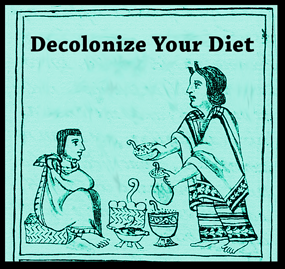Decolonize Your Diet
This project is rooted in our personal and familial experience with cancer, diabetes, and other diseases associated with the Standard American Diet (SAD). Our goal is to highlight the wealth of Mexican and Chicano/a culture in regards to traditional foods, herbs, and remedios, and to teach the next generation of students how to reclaim their heritage and eat healthy. As Ethnic Studies professors, we bring a critical analysis of the legacies of colonization, cultural resilience, and feminism to our study of the daily practice of preparing and eating healthy, ancestral food. We advocate a ‘liberation of the kitchen,’ so that people of all genders can reclaim cooking as a site of creative resistance to white supremacy and patriarchy.
Panelists
Luz Calvo received her PhD in the History of Consciousness Program at UC Santa Cruz in 2001. She is an associate professor of Ethnic Studies at Cal State East Bay, where she teaches a course entitled, “Decolonize Your Diet: Food Justice in Communities of Color.” Luz traces her food genealogy to her paternal grandparents, who ran a Mexican restaurant in San Fernando, California, from the 1940s through the 1970s. The Calvo business began 2 when the grandparents began selling tacos to the cannery workers, with her grandfather purchasing fresh, seasonal ingredients from the Los Angeles Central market, and her grandmother preparing and packaging the tacos. In 2006, Luz was diagnosed with breast cancer. This diagnosis led Luz to intensive research on food and her commitment to eating clean, whole, organic food. For her, every meal is an opportunity to prevent the cancer from recurring. So far, so good!
Catrióna Rueda Esquibel received her PhD in the History of Consciousness Program at UC Santa Cruz (1999). She is an associate professor in Race and Resistance Studies at San Francisco State University. She is the author of With her Machete in her Hand: Reading Chicana Lesbians (University of Texas Press, 2006) and has also published poetry, drama, and literary criticism. Her father’s family has lived in northern New Mexico for more than twelve generations. On her mother’s side, her great-great-grandmother, greatgrandmother, and grandmother all migrated from Sonora to Los Angeles between 1913 and 1919. Each of these women made a living cooking for Mexican migrant workers and Chicanos/as in Los Angeles. Catriona is interested in diet and diabetes because her father and many of his siblings were diagnosed with type 2 diabetes. In one generation, as they moved from New Mexico to Los Angeles, their diet went from grass fed beef, home-raised chickens, and home-grown vegetables and local herbs on the ranch to highly processed foods.
Event Details:
Date: April 14, 2015
Time: 12:30 p.m. - 2:00 p.m.
Location: Aztec Student Union Theater
Faculty Leader:
Irene Lara, Associate Professor, Womens Studies
